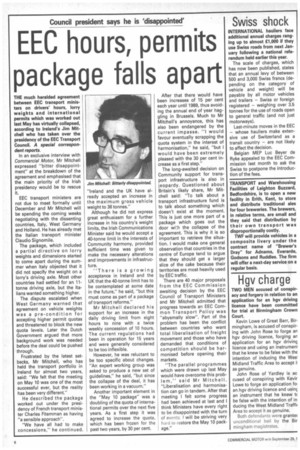EEC hours, permits package falls apart
Page 8

If you've noticed an error in this article please click here to report it so we can fix it.
THE much heralded agreement between EEC transport ministers on drivers' hours, lorry weights and international permits which was worked out last May has virtually collapsed, according to Ireland's Jim Mitchell who has taken over the presidency of the EEC Transport Council. A special correspondent reports.
In an exclusive interview with Commercial Motor, Mr Mitchell expressed "bitter disappointment" at the breakdown of the agreement and emphasised that the main priority of the Irish presidency would be to rescue It.
EEC transport ministers are not due to meet formally until December and Mr Mitchell will be spending the coming weeks negotiating with the dissenting countries, Italy, West Germany and Holland. He has already met the Italian transport minister Claudio Signomile.
The package, which included a partial directive on lorry weights and dimensions started to come apart during the summer when Italy objected that it did not specify the weight on a lorry's driving axle. Most other countries had settled for an 11tonne driving axle, but the Italians wanted something higher.
The dispute escalated when West Germany warned that agreement on vehicle weights was a pre-condition for accepting higher permit quotas and threatened to block the new quota levels. Later the Dutch Government argued that more background work was needed before the deal could be pushed through.
Frustrated by the latest setbacks, Mr Mitchell, who has held the transport portfolio in Ireland for almost two years, said: "We felt that the meeting on May 10 was one of the most successful ever, but the reality has been very different."
He described the package worked out under the presidency of French transport minister Charles Fitemman as having "a sensible approach".
"We have all had to make concessions," he continued. "Ireland and the UK have already accepted an increase in the maximum gross vehicle weight to 38 tonnes."
Although he did not express great enthusiasm for a further increase in his country's weight limits, the Irish Communications Minister said he would accept a 40-tonne limit in the interests of Community harmony, provided sufficient time was given to make the necessary alterations and improvements in infrastructure.
"There is a growing acceptance in Ireland and the UK that the 40-tonne limit has to be contemplated at some date in the future," he said, "but this must come as part of a package of transport reforms."
Mr Mitchell declared his support for an increase in the daily driving limit from eight hours to nine with a twice weekly concession of 10 hours. The current regulations had been in operation for 15 years and were generally considered to be too inflexible.
However, he was reluctant to be too specific about changes. "An expert working group was asked to produce a new set of guidelines," he said, "but since the collapse of the deal, it has been working in a vacuum."
Another important element in the "May 10 package" was a doubling of the quota of international permits over the next five years. As a first step it was agreed to increase the quota, which has been frozen for the past two years, by 30 per cent. After that there would have been increases of 15 per cent each year until 1989, thus avoiding the annual end of year haggling in Brussels. Much to Mr Mitchell's annoyance, this has also been endangered by the current impasse. "I would favour eventually scrapping the quota system in the interest of harmonisation," he said, "but I would have been extremely pleased with the 30 per cent increase as a first step."
The long-awaited decision on Community support for transport infrastructure is also in jeopardy. Questioned about Britain's likely share, Mr Mitchell said: "To talk about a transport infrastructure fund is to talk about something which doesn't exist at the moment. This is just one more part of a package which goes out the door wiih the collapse of the agreement. This is why it is so important to retrieve the situation. I would make one general observation that countries in the centre of Europe tend to argue that they should get a larger slice of the cake because their territories are most heavily used by EEC traffic.
There are 40 major proposals from the EEC Commission awaiting decision by the EEC Council of Transport Ministers and Mr Mitchell admitted that progress towards an EEC Common Transport Policy was "abysmally slow". Part of the problem has been the conflict between countries who want total liberalisation of freight movement and those who have demanded that conditions of competition should be harmonised before opening their markets.
"The parallel programmes which were drawn up last May would have overcome this problem,'' said Mr Mitchell. "Liberalisation and harmonisation can go in tandem. After that meeting I felt some progress had been achieved at last and I think Ministers have every right to be disappointed with the turn of events I will be striving very hard to restore the May 10 package."
















































































































